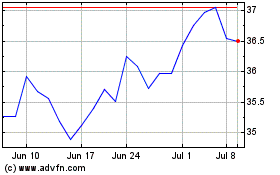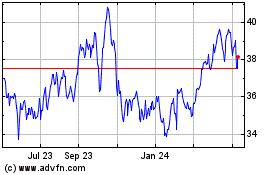Big Oil CEOs Pledge $1 Billion to Fund Low-Carbon Technology -- Update
November 04 2016 - 9:35AM
Dow Jones News
By Sarah Kent
LONDON--Ten of the world's biggest oil companies plan to invest
an average of $100 million annually over the next 10 years in
low-carbon technologies, the companies said Friday.
The Oil and Gas Climate Initiative, which includes state-owned
Saudi Arabian Oil Co., Royal Dutch Shell PLC and BP PLC, said its
investments will initially focus on carbon capture and storage
technology and efforts to reduce methane emissions from the
oil-and-gas industry. Those efforts could significantly improve the
prospects for the sector in a lower-emission world.
The pledged funding is the latest sign of the oil industry's
efforts to respond to pressure from governments, activists and
increasingly investors. The announcement came on the same day that
a climate treaty negotiated in Paris last year by more than 200
countries to cap emissions and curb global warming comes into
force, potentially limiting the use of fossil fuels such as oil and
gas.
Environmental groups said the oil companies' pledge of $1
billion over a decade wasn't close to enough and represents a tiny
fraction of the group's annual spending on finding and producing
fossil fuels.
"They are committing just $100 million a year each for 10
years," said Jeremy Leggett, chairman of the Carbon Tracker
Initiative. "Given that the world has to mobilize trillions of
dollars a year for clean energy within that time frame, if the
Paris goal is to be realized, this is quite simply nowhere near
good enough," he said.
The consortium said its joint investment plan represents " an
unprecedented level of oil-and-gas industry collaboration and
resource-sharing."
The companies are increasingly looking toward a future in which
demand for their core products--oil and gas--could begin to
wane.
Total SA owns one of the largest solar companies in the world
and earlier this year bought French battery maker Saft Group SA.
Shell has created a "new energies" division to invest in renewables
and low carbon power, and even Saudi Arabia is looking into
developing solar power within the Kingdom.
Shell's Chief Financial Officer Simon Henry caused a stir
earlier this week when he said the company believes demand for oil
could stop growing within the next two decades and as soon as five
years. Known as "peak demand," the arrival of the day when consumer
demand for oil begins falling has become a central worry for the
fossil-fuel industry.
"We've long been of the opinion that demand will peak before
supply," Mr. Henry told analysts Tuesday. "And that peak may be
somewhere between five and 15 years hence, and it will driven by
efficiency and substitution."
With that view in mind, many big oil companies have become more
vocal about their efforts to adapt to a lower-carbon world and
diversify their businesses, while also emphasizing that oil and gas
will remain vital energy sources for decades to come.
The Oil and Gas Climate Initiative was created in 2014 with
United Nations backing to find ways the industry can support
efforts to tackle climate change while continuing to produce its
reserves. Its members include giant state companies and Europe's
biggest oil producers, but not the biggest American companies like
Exxon Mobil Corp. and Chevron Corp. Together they pump about a
fifth of the world's oil and gas output.
Write to Sarah Kent at sarah.kent@wsj.com
(END) Dow Jones Newswires
November 04, 2016 09:20 ET (13:20 GMT)
Copyright (c) 2016 Dow Jones & Company, Inc.
BP (NYSE:BP)
Historical Stock Chart
From Mar 2024 to Apr 2024

BP (NYSE:BP)
Historical Stock Chart
From Apr 2023 to Apr 2024
